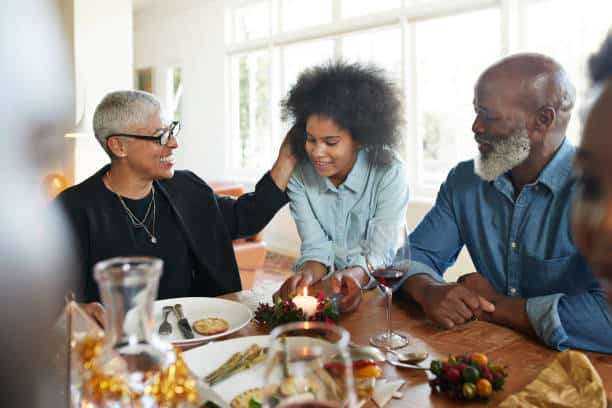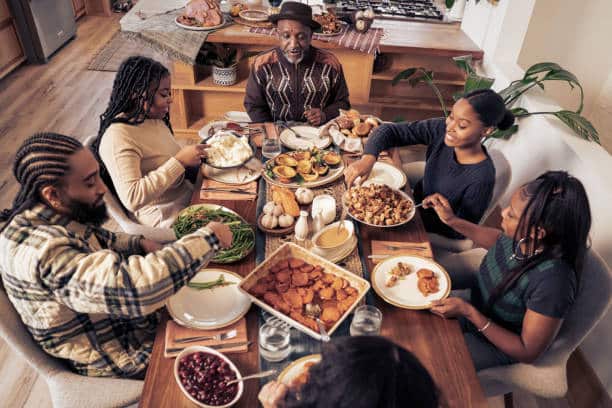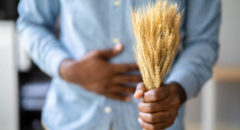
The holidays are all about family, flavor, and full plates, but for people living with Crohn’s disease or ulcerative colitis, those same dishes can come with a side of stress. From rich gravies to creamy casseroles, traditional favorites can easily trigger painful flare-ups. Here are some tips to manage irritable bowel disease (IBD) during the holidays and beyond.
With Crohn’s disease and ulcerative colitis, the two types of IBD, during the holiday season, you need a plan of attack if you want to participate in the fun but not the food. “The most wonderful time of the year” for you could mean a worsening of your symptoms. The big dinners and “seasonal stress” can trigger a flare-up.
Here are some ways to manage Crohn’s and ulcerative colitis by proactively avoiding flare-ups during the holidays.
RELATED: 10 Natural Ways to Improve Digestion Right Now
1. Be prepared and know your triggers
The phrase “just in case” was made for you during times like these. Plan ahead and prepare for the event. Bring extra medications, keep them on you, and have medical supplies and a change of clothes in case you need them. You could make time for yourself and do things that can help you stay calm and relaxed before, during, and after the event.
Don’t forget about exercising and making sure you’re getting enough sleep. If there’s an expectation to eat all the things, especially, let them know what that includes or eliminates for you in advance. This pressure to eat what’s offered can create its own stress. Lastly, it’s okay to tell family or friends you’re not feeling well and decide to leave early to go home to feel better, despite all of your efforts.
2. BYOM?
BYOM? Yes, bring your own meal…to share and guarantee you have something you can eat, too. Examples of IBD-friendly dishes for the traditional Thanksgiving meal include tender, lean protein that is slow-cooked, like poultry, salmon, or even tofu. Roasted, mashed, and pureed root vegetables that are peeled and “fork-soft” are also a good idea. Green bean casserole is a great dish for you to control the preparation of and contribute as your signature and “safe” dish.
Just swap out the IBD-unfriendly ingredients for some IBD-friendly ingredients, and voilà, you have a healthier version made for you by you. This also works for sweet potato casserole and even pumpkin pie! The key is food preparation that adjusts texture, not taste. The result is cuisine that contains easier-to-digest ingredients in an easier-to-digest form. Lastly, what’s a holiday meal without dessert? Try baked apples and pears without hard-to-digest skin that is created with easier-to-digest ingredients and an oat crumble on top: a sure winner.
3. Adapt if you can’t adopt or avoid traditions
For those with dietary restrictions, social survival tips can include incorporating substitutions or alternatives. These can make holiday traditions related to the food something you can share in the fun of, even though you may not partake of it. The focus of holidays like Thanksgiving can become less about surviving triggers and making good food choices and more about making it possible for all to enjoy more of the holidays, stressors, and traditional meals, notwithstanding. If those you are with are open to accommodating you when you gather, you have valuable support.
Take the emphasis off food and spend time on activities like games and catching up with folks you may not see that often or only during the holidays. Lastly, communicating your needs in advance or giving advance notice that you’d like to bring a dish to share, for example, can optimize your enjoyment of the holidays and serve you well in other gatherings beyond this season. These suggestions can help you feel less like the holidays are a burden to get through, navigate, stress over, or manage by any means necessary. This perspective opens up more social opportunities where you choose what to accept and what to avoid before you decide if or how you will participate.
4. Do the “right” thing?
Never is it an option to mindlessly indulge in the holiday treats if one lives with Crohn’s or ulcerative colitis. Instead of feelings of deprivation, be intentional about the food you choose for your meal if you have Crohn’s or ulcerative colitis. Then eat mindfully, savoring small portions, allowing you to eat, stay hydrated, and be merry to your fullest extent possible. Although the fear of a flare-up may be a worry, it doesn’t have to keep you away from engaging in all the other non-food-related joys of the season. Nevertheless, with every bite, IBD-friendly or not, there is always the possibility of paying for it later if you indulge. This is true even if you do everything “right.” Despite all the best laid plans, sometimes your body doesn’t cooperate.
RELATED: 5 “Safe” Restaurant Meals for Sensitive Stomachs

5. Family drama counts as a trigger, too
Family and friends’ support can go a long way. But criticizing, showing out, fighting, or arguing with a family member or friend can trigger symptoms if you have IBD, too. Those who are closest to you may take it personally when you don’t take a big helping of Auntie’s mac and cheese. They may not understand or sympathize with the why behind what’s different on your plate. Additionally, why and when you need to take care of yourself by spending some time alone doesn’t matter to them; they may think you are acting stuck-up, entitled, or ungrateful.
All of these social situations create extra stress that is also a trigger. This can make the holidays “painful and uncomfortable” if you have Crohn’s or ulcerative colitis. Build a bridge. Choose peace and set expectations early with the family and friends you will celebrate with, as best you can, in order to keep the holiday meals happy for all.
6. Keep it moving
Try decreasing your holiday stress by prioritizing exercise, such as walking around the neighborhood after the big meal. It helps with digestion and opens another way to socialize, not traumatize. Doing yoga or meditation to invite calm to your spirit can also help cope with stressful situations and reduce the impact of stressful people. Keeping it moving to manage your triggers is a good idea, not just during the holidays, but all year round. Make movement part of your holiday traditions and let it become an outside-of-the-box gift they’ll remember, look forward to, practice, enjoy, and be grateful for from this season to the next.









